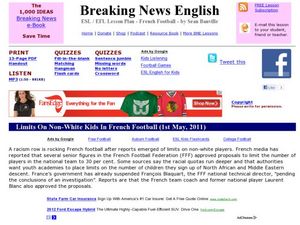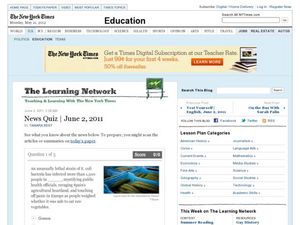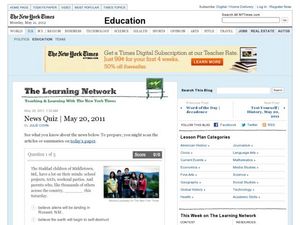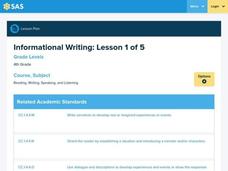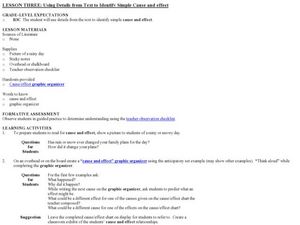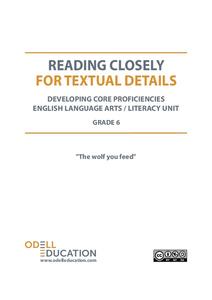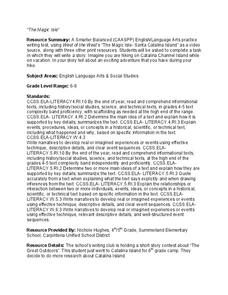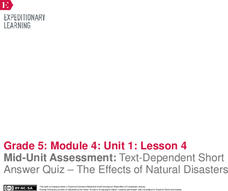Curated OER
Breaking News English: French Football
Intermediate or early advanced English speakers practice their reading comprehension skills with this short passage and its accompanying activities. After reading the text, learners talk about racism, discrimination, equality, and...
Curated OER
News Quiz | June 2, 2011
The world is full of new information every day, keep the class informed by having them read the daily paper. They read or scan the New York Times from June 2, 2011 to answer five related multiple choice questions.
Polk Bros Foundation
A Way to Analyze Paragraphs to Figure Out the Main Idea of a Nonfiction Text
Shrink up a section by asking pupils to write down the main idea for each of seven paragraphs. There is a space provided for each main idea. When students have completed this portion, they write down what they think to be the central...
Curated OER
Charity Begins at Home
Build stronger informational comprehension in your language arts class. Learners read a 7-paragraph article about charity, then respond to 6 short answer questions. Vocabulary words and definitions are included.
Curated OER
News Quiz | May 20, 2011
Take this daily news quiz to see how informed you are about events that made headlines on May 20, 2011. Check out each of the five questions in the quiz, read or scan the paper to find the answers, and then take the quiz to test your...
Curated OER
News Quiz | May 2, 2012
Information is easy to come by when you have resources like the New York Times. Kids read the Times from May 2, 2012 and then answer a five questions multiple choice quiz.
Curated OER
News Quiz: May 17, 2012
Keep that class well-informed by having them read the news everyday. They'll read several New York Times articles posted on May 17, 2012, then answer each of the five multiple choice questions.
Curated OER
News Quiz | Jan. 3, 2012
What do your informed citizens know about events that made the news on January 3, 2012? Have them take this five question quiz to find out. After they have taken the quiz they can scan the New York Times from that day to see how much...
Curated OER
News Quiz | May 25, 2011
Glean a little information for the New York Time published on May 25, 2011. Kids take a glance at the paper from that day to help them answer five multiple choice questions, related to the paper's content.
Pennsylvania Department of Education
Informational Writing
Emerging writers identify an informational piece of writing. They are provided with examples of informational writing and view a PowerPoint on narrative writing. Then, they design their own informational writing with a brochure,...
Curated OER
Lesson Three: Using Details from Text to Identify Simple Cause and Effect
Third graders identify cause and effect. For this cause and effect lesson, 3rd graders use a graphic organizer to predict effects for certain causes. They read a non-fiction text and put sticky notes marking causes and effects.
Odell Education
Reading Closely for Textual Details: Grade 6
Close reading doesn't mean to literally read text close to your face, but rather to pay attention to particular details in order to develop a deep and purposeful understanding of text. The first part of a five-part resource provides an...
EngageNY
Reading and Taking Notes on Colonial Trades
In the tenth instructional activity of this unit, young scholars learn to categorize information as they continue researching their colonial trade. During guided practice, the teacher models how to read informational text slowly while...
Curated OER
Writer's Toolbox
Present the class with a slide show that will give them a great head start in writing expository and narrative texts. The information is highlighted for easy note taking, well organized, and presented in a kid-friendly manner. It...
US Department of Education
School-Home Links elling, self-to-text connections, writing lists, author
Engage families in at-home practice using this 100-page worksheet packet for elementary school English Language Arts practice. Each worksheet briefly explains the objective to parents so they can guide their child through the activity....
Core Knowledge Foundation
Astronomy Tell It Again!™ Read-Aloud Anthologys
A read-aloud anthology focuses on astronomy. Each week for three weeks, first graders are introduced to and listen to a text, answer comprehension questions, then complete extensions that include a learning activity and skills practice....
Curated OER
Cause and Effect Relationships - Silence of the Bees
Why are bees disappearing? Explore cause and effect relationships with this interesting question. As the detailed lesson plan indicates, start by brainstorming some of the possible effects the disappearance of bees would have on the...
Core Knowledge Foundation
The History of the Earth Tell It Again!™ Read-Aloud Anthology
A read-aloud anthology focuses on Earth's history. Over three weeks, young scholars listen to and discuss stories about the layers of the Earth, minerals, fossils, different kinds of rocks, and dinosaurs. After the lesson's text, each...
Core Knowledge Foundation
A New Nation American Independence Tell It Again!™ Read-Aloud Anthology
Sixteen lessons make up a read-aloud anthology centered around America's journey toward independence. Scholars hear texts about the Boston Tea Party, Betsy Ross, the Found Fathers, the Liberty Bell, and more! Pupils discuss their...
Curated OER
Campaign Trailblazers
Explore the backgrounds, qualifications, and platforms of the presidential candidates for the 2000 election. Though the instructional activity is outdated, the activities within the informational text could be good practice for your...
Core Knowledge Foundation
Unit 4: The Renaissance
The Renaissance is the theme of a five-week unit designed to boost reading comprehension, spelling, vocabulary, and expository writing skills. Scholars listen to and discuss daily readings and engage in skills practice activities...
Channel Islands Film
Magic Isle: Lesson Plan 3
Middle schoolers complete a writing assessment task to demonstrate their ability to craft a narrative based on a variety of informational texts. They view West of the West's documentary Magic Isle, read three print resources about the...
EngageNY
Mid-Unit Assessment: Text-Dependent Short-Answer Quiz—The Effects of Natural Disasters
Readers complete a mid-unit assessment by reading the text How Do Hurricanes Form? They answer text-dependent questions about hurricanes with short answer and sequencing. Learners then participate in a read aloud and text chunking...
Curated OER
Locate Key Information in Nonfiction Text
Interpret nonfiction text with your class. Readers use key information found in nonfiction text to answer questions and problem solve. They utilize the chapter headings, diagrams, glossary, maps, and captions as well as the table of...
Other popular searches
- Informational Text Features
- Informational Text Passages
- Teaching Informational Text
- Informational Text Structure
- Writing Informational Text
- Informational Texts Unit
- Informational Text Lesson
- Comprehend Informational Text
- Summarizing Informational Text
- Using Informational Texts
- Analyzing Informational Text
- Informational Text8rating=3


